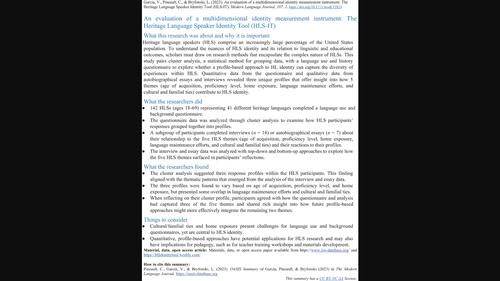当前位置:
X-MOL 学术
›
Mod. Lang. J.
›
论文详情
Our official English website, www.x-mol.net, welcomes your
feedback! (Note: you will need to create a separate account there.)
An evaluation of a multidimensional identity measurement instrument: The heritage language speaker identity tool (HLS-IT)
The Modern Language Journal ( IF 4.7 ) Pub Date : 2023-05-04 , DOI: 10.1111/modl.12833 Valerie Garcia 1 , Caitlyn Pineault 1 , Lara Bryfonski 1
The Modern Language Journal ( IF 4.7 ) Pub Date : 2023-05-04 , DOI: 10.1111/modl.12833 Valerie Garcia 1 , Caitlyn Pineault 1 , Lara Bryfonski 1
Affiliation

|
This mixed-methods study explores the efficacy of a multidimensional identity measurement tool that aims to represent the diverse language experiences of heritage language learners (HLLs) and heritage language speakers (HLSs). Drawing on the thematic commonalities across 13 definitions of HLLs, a questionnaire was developed to capture age of acquisition, self-reported proficiency level, home exposure, language maintenance efforts, and cultural and familial ties to the heritage community. Questionnaire data spanning HLSs (N = 135) of 41 heritage languages were submitted to K-means cluster analysis to investigate identity-based trends across respondents. Interviews (n = 10) and autobiographical essays (n = 4) from a subset of respondents from each resulting cluster were thematically analyzed and used to corroborate descriptive HLS profiles from cluster analysis results. Three HLS profiles emerged from the data set, and their defining characteristics (based on the five HLL identity themes) illustrate the complex interplay of language, culture, family, and education within the HLS population. Qualitative analysis of respondents’ perspectives highlights the challenges of quantitatively measuring inherently qualitative experiences. The study concludes with implications for how questionnaire-based instruments derived from bottom-up statistical analyses can be leveraged in future research, advancing the agendas of linguists and educators to better understand and support HLSs.
中文翻译:

多维身份测量工具的评估:传统语言说话人身份工具(HLS-IT)
这项混合方法研究探讨了多维身份测量工具的功效,该工具旨在代表传统语言学习者 (HLL) 和传统语言使用者 (HLS) 的不同语言体验。根据 HLL 的 13 种定义的主题共性,开发了一份调查问卷,以获取习得年龄、自我报告的熟练程度、家庭接触、语言维护工作以及与传统社区的文化和家庭联系。将跨越 41 种传统语言的 HLS(N = 135)的问卷数据提交给 K-means 聚类分析,以调查受访者的基于身份的趋势。访谈(n =10)和自传体论文(n = 4) 来自每个结果集群的一部分受访者进行了主题分析,并用于证实来自集群分析结果的描述性 HLS 配置文件。数据集中出现了三个 HLS 概况,它们的定义特征(基于五个 HLL 身份主题)说明了 HLS 人口中语言、文化、家庭和教育的复杂相互作用。对受访者观点的定性分析突出了定量测量内在定性体验的挑战。该研究总结了如何在未来的研究中利用从自下而上的统计分析中得出的基于问卷的工具,推进语言学家和教育工作者的议程,以更好地理解和支持 HLS。
更新日期:2023-05-04
中文翻译:

多维身份测量工具的评估:传统语言说话人身份工具(HLS-IT)
这项混合方法研究探讨了多维身份测量工具的功效,该工具旨在代表传统语言学习者 (HLL) 和传统语言使用者 (HLS) 的不同语言体验。根据 HLL 的 13 种定义的主题共性,开发了一份调查问卷,以获取习得年龄、自我报告的熟练程度、家庭接触、语言维护工作以及与传统社区的文化和家庭联系。将跨越 41 种传统语言的 HLS(N = 135)的问卷数据提交给 K-means 聚类分析,以调查受访者的基于身份的趋势。访谈(n =10)和自传体论文(n = 4) 来自每个结果集群的一部分受访者进行了主题分析,并用于证实来自集群分析结果的描述性 HLS 配置文件。数据集中出现了三个 HLS 概况,它们的定义特征(基于五个 HLL 身份主题)说明了 HLS 人口中语言、文化、家庭和教育的复杂相互作用。对受访者观点的定性分析突出了定量测量内在定性体验的挑战。该研究总结了如何在未来的研究中利用从自下而上的统计分析中得出的基于问卷的工具,推进语言学家和教育工作者的议程,以更好地理解和支持 HLS。











































 京公网安备 11010802027423号
京公网安备 11010802027423号